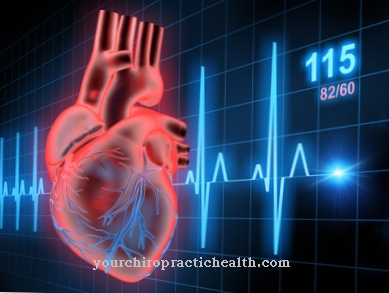One of the reasons many people have trouble maintaining or losing weight today is because they are troubled Satiety. There can be different reasons.
What is the feeling of satiety?

A feeling of satiety is a body signal that occurs while eating and shows the person eating that he can no longer take in any more food. It is controlled by the brain and is a complex process, the details of which have not yet been fully explored. The interaction between hunger and satiety is responsible for supplying the body with sufficient food and nutrients.
A distinction is made between a feeling of satiety and a feeling of satiety that only occurs a while after a meal. In the case of disorders of the feeling of satiety, the body's regulatory mechanisms between hunger, appetite and satiety do not work or no longer function properly.
Function & task
The job of satiety is to tell the body when it has consumed enough food and nutrients. The feeling of satiety is the counterpart to the feeling of hunger, which tells the body when food is needed. Food intake is regulated through the interplay of hunger and satiety.
It is controlled via the hypothalamus in the diencephalon. In this area of the brain, all internal and external stimuli are evaluated during food intake and messenger substances are released that convey a feeling of satiety to the body. In this context, satiety is not synonymous with being full; being full takes a while after a meal and describes the state after a meal until the next feeling of hunger sets in.
In the hypothalamus there is a hunger center and a satiety center that are active at different times. Both are part of the Orexian network that controls food intake. The stomach sends the first satiety signals when eating when the ingested food stretches the walls of the stomach. This stimulus signal is received by the hypothalamus.
However, the saturation signal does not come from the full stomach alone, but chemoreceptors send parallel signals to what extent nutrients have been absorbed. These receptors are located in the intestines and in the liver.
Both signals together have an impact on the feeling of satiety and the amount of food consumed. For example, if only a large amount of low-calorie liquid is drunk, the stomach will expand and give a signal, but the chemoreceptors will not react and there will be no feeling of satiety. It works the other way around. When a small amount of high-density food has been consumed, the chemoreceptors react because enough nutrients have been absorbed, but the stomach does not because the walls have not been stretched enough.
Other signals of saturation are transmitted to the brain by hormones that are formed in the intestine during the digestive process, partly via the blood, partly via nerve tracts, etc. a. Insulin and leptin. As soon as a variety of satiety signals are sent to the hypothalamus, it reacts with the release of appetite-suppressing substances such as serotonin.
How many factors work together in the feeling of satiety has not yet been researched. In addition to physiological influences, psychological ones probably also play a role.
Illnesses & ailments
In various eating disorders such as overweight (obesity), vomiting (bulimia) and food cravings (binge eating), the interplay of hunger, appetite and satiety does not work or does not work completely.
Even if the causes have not been fully researched, it has been shown that in people who frequently eat large portions, the stomach walls take longer to respond to the stretch. As a result, they tend to overeat. Those who eat hastily eat so quickly that the meal is over before a feeling of fullness is even reported.
In the case of overweight people, it is not entirely clear whether they are no longer sending the correct saturation signals or whether they cannot perceive them properly. Researchers suspect that frequent diets irritate the metabolism and thus also the regulation of hunger and satiety. Based on diet experiences, the body fears that it will have to create reserves for future "periods of hunger" such as diets and no longer sends a feeling of satiety.
Mental health problems can also affect and significantly disrupt the balance of appetite, hunger and satiety. B. fear, anger, sadness or tension. In people with cravings, such as those that occur with bulimia, binge eating, but also with some overweight people, control over hunger and satiety is completely lost. Often they only stop eating when they feel sick.
Psychologists see one of the causes in too strictly regulated eating behavior, both in diets and in permanently head-controlled eating. People who eat under the control of their head avoid "unhealthy" foods and stop eating before they feel full to save calories. As a result, the body constantly remains below the required amount of calories and, according to psychologists, defends itself at some point in the form of food cravings when the control of the will z. B. is weakened by stress. The yo-yo effect after weight loss through dieting is an example of this.













.jpg)

.jpg)
.jpg)











.jpg)